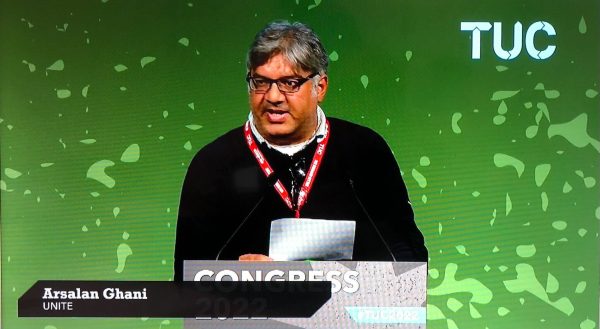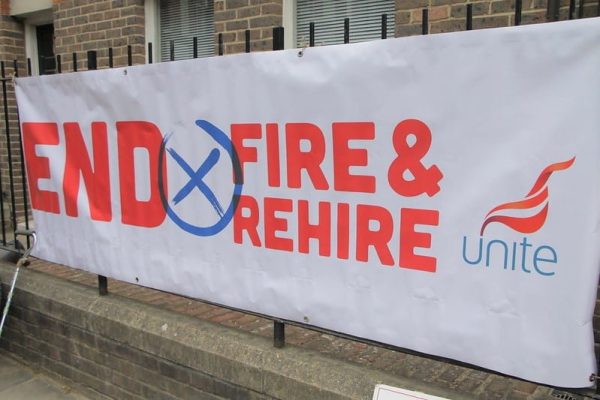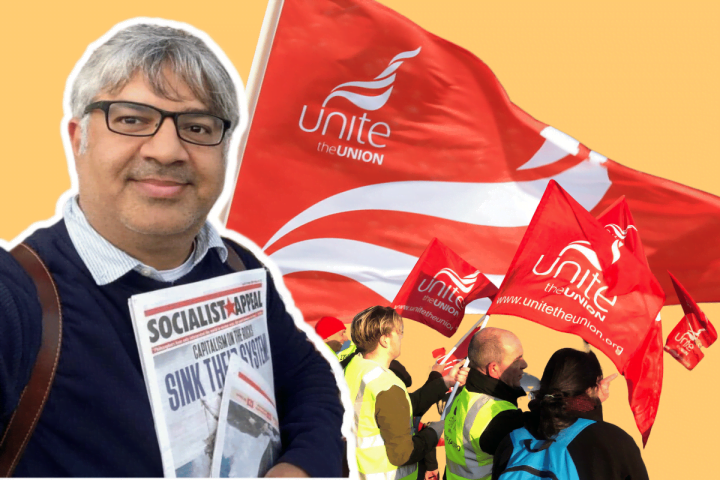Elections for a new executive are underway in Unite, Britain’s biggest trade union. Under Sharon Graham’s leadership, Unite has helped secure many important victories for workers. This militant approach must now be spread throughout the union.
Workers in Britain are facing the worst fall in living standards since records began. RPI inflation officially stands at 14%. But price rises for essential food items are reaching 30-40%.
This follows a decade of real wage cuts by employers in both the private and public sectors. In many sectors, real-terms pay has declined by around 20-30% over the last 10 years.
More than ever, the bosses and the Tory government are on the offensive. In response, Unite, along with our sister unions, is waging a fightback.
With the capitalist class digging their heels in, this will be a long and bitter struggle. As a result, our union must be fighting fit for the period ahead.
Since being elected as general secretary, Sharon Graham has taken important steps forward in this respect. But we can and must go further.
The upcoming executive council (EC) elections provide the opportunity to deepen these changes, which have empowered rank-and-file members to fight a record number of disputes with wholehearted support from the union – winning important victories along the way.
This is why I am standing for the Unite EC, in the education sector seat, campaigning on Sharon Graham’s platform of building industrial strength across the union.
I will work to help our general secretary carry out the programme she was elected on – fighting to transform Unite into a militant, democratic union.
Marketisation of education

Historically, the education sector has had a reputation of being well-paid, with good working conditions. But today, the situation has never been so dire.
Falling pay is coupled with Tory cuts to universities, further education, and technical institutions. As a result, the sector is increasingly being carved up by the capitalists, accelerating the decline in terms of conditions and wages.
A programme of marketisation is being carried out systematically across higher education. This means the imposition of larger fees and rents for students. And it means a rampant rise in privatisation and outsourcing.
Services such as cleaning, catering, maintenance, estates, security, technicians, IT, training, and even teaching and supervision are all now being outsourced at many institutions.
Private contractors are making huge profits, feasting like vultures. They do so by degrading services and attacking staff conditions: bringing in casualised contracts, reducing staff levels, and deskilling. Additionally, outsourced companies often have no collective bargaining arrangements.
Workers in many universities have held protests and even strikes against outsourcing recently, including at Leeds, Cambridge, UCL, Greenwich, and Sussex.
Unite the Union can and must turn this situation around by fighting back against the employers who are driving down pay and conditions. And given that we represent members all across the education sector, our union has the potential to play a leading role in this struggle.
Kick out the profiteers

Despite the crisis, universities are still building fancy new buildings and making other superficial investments, in an effort to entice big business sponsors and wealthy donors – and also to attract foreign students, who have to pay even higher fees than home students.
At the same time, in secondary and further education, academisation has seen many schools and colleges transformed into private enterprises.
Across the sector, a whole swathe of corporate management professionals are hired on six-figure salaries, with the goal of ‘bringing in money’ and ‘managing investments’. But the money these bosses ‘earn’ is the result of exploiting staff and undermining services.
This is the logic of capitalism: not investment to better these institutions of learning and research, in the interests of society; but instead investment to expand the profits of the bosses and shareholders.
And whenever a crisis hits, as it is now, it is staff who bear the brunt. Massive redundancies are currently being carried out across the sector, alongside the imposition of ‘fire and rehire’. Departments and centres that cannot ‘generate revenue’ and implement ‘savings’ are being closed.
Pension systems are collapsing, with universities abandoning their obligation to support staff in retirement. It’s no surprise that pension reform is one of the key demands for striking higher education staff.
As a committed socialist, if elected, I would raise the need not only to fight back against these attacks, but to fight for a fully publicly-owned education system, under the democratic control of staff and students.
Only on this basis can we remove the pernicious influence of profit in the sector, as well as that of bureaucratic management.
Class fighters

Under Sharon’s leadership, Unite has won over 80% of the industrial disputes we have been involved in, securing over £250 million in additional pay and benefits for workers.
We need to ensure that we build on our wins and grow our union by electing an EC that shares Sharon’s vision for Unite.
This means prioritising and empowering rank-and-file members and reps in order to keep winning. We must completely break with the old methods and structures of top-down committees, which take little action while leaving members in the dark.
Already, we have taken steps forward: introducing combines, for example, to bring together reps within sectors and industries.
But I think we can go further. We should look to further democratise the union – ensuring accountability, and placing as much power in members’ hands as possible.
In my opinion, this should mean ensuring that full-time officials in the union are democratically-elected for a set period of time; subject to recall; and on the same average wage as the members they represent.
This will help to bring through the best class fighters from the rank and file of the union, and strengthen members’ trust in the union structures and officials. And it will prevent the danger of union collusion with the bosses, as we saw with the blacklisting scandal in construction.
With so many sister unions taking action, we should also support the formation of cross-union strike committees during disputes, in order to strengthen links at a rank-and-file level in workplaces and industries.
This can ensure that the action we take is as coordinated and effective as possible. Together we are stronger. United we can win our disputes and struggles.
Through such changes, we can provide our members with confidence in their union – boosting membership, increasing participation, and forging a new generation of militant activists. And we can place our union in the best position to take the fight to the bosses in the battles breaking out across industry, and win for our class.






